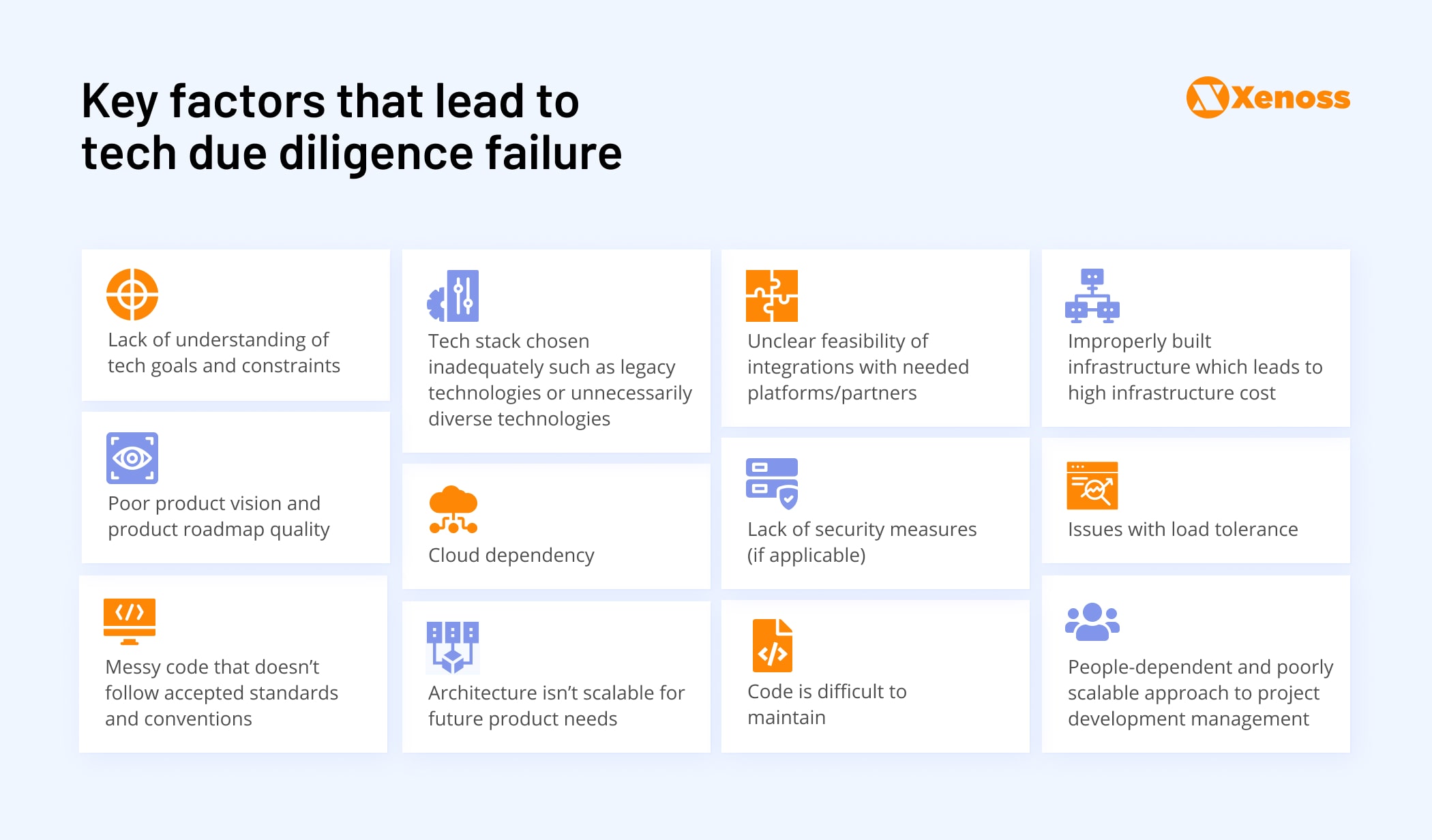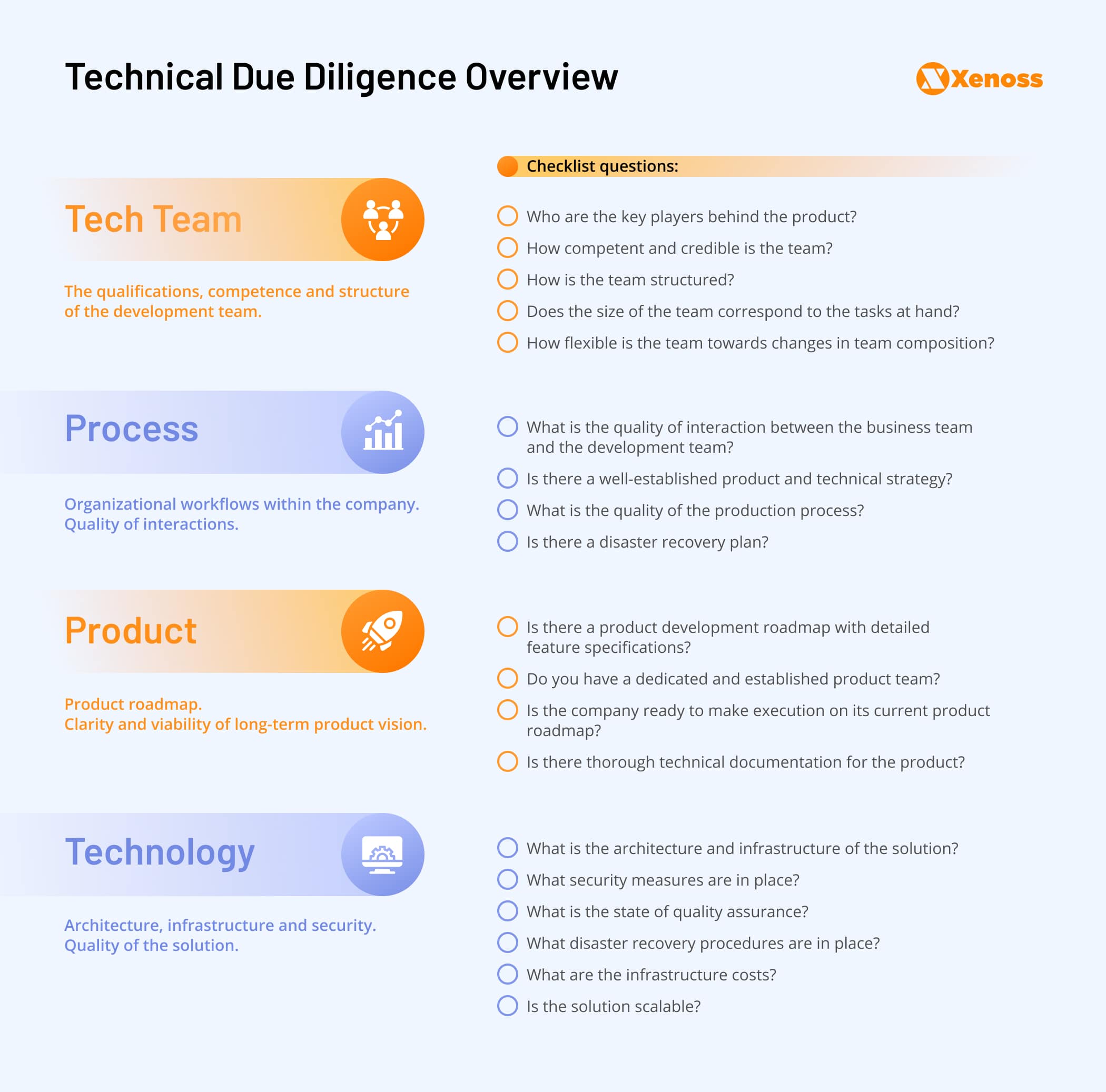Technical due diligence, an important milestone for startup teams, is tedious and nerve-wracking. But if you’re looking for funding or preparing your company for acquisition, you cannot avoid it.
When it comes to technical due diligence, it’s not something you get ready for in a couple of weeks. You cannot just put all your documentation in order, clean up the code here and there, and be good to go.
You prepare by being aware that at one point or another your product will be analyzed and evaluated. You should make every decision in the development process with tech due diligence in mind. But how?
We’ve got your back with our straight-to-the-point technical due diligence overview. You can also use it as a point of reference when developing your product or preparing for the next business milestone.
Why is technical due diligence important?
First things first, let’s take a closer look at the idea behind technical due diligence.
Technical due diligence has two main tasks:
- Analyze the quality of the existing product version.
- Analyze readiness of the product for the future.
Experienced investors, CTOs, and engineers highly value tech due diligence. Here’s what Daniel Doubrovkine, principal engineer at AWS, had to say about it:
“Technical due diligence establishes a more realistic view of the company’s technology and easily highlights cultural qualities and dysfunctions in technical teams by asking important questions. It avoids a lot of surprises during the first board meeting after the investment. It also usually costs less than the lawyers involved in any deal.”
Why do startups fail technical due diligence?
There are 305 million startups founded each year. However, over time most are crushed by reality – 50% of newly founded companies go out of business within 5 years.
What is the reason for the 50% failure rate? There are many little calamities that keep projects from steady growth.
Some of them are market-related, such as political and economic landscapes, others have to do with lack of strategic planning, poor understanding of target audiences, or talent retention struggles.
Also, there are product-related startup failure factors. Tech due diligence is designed to expose these red flags and protect investors from poor judgment calls.
Here are the key reasons why investors pass on initially promising projects.

Components of technical due diligence
While there is no industry standard for a technical due diligence checklist for startups, there are specific focus areas stakeholders and VC investors focus on.
Based on this, we grouped the main components of technical due diligence into four categories – technical team, process, product, and technology.
This will make it easier for you to know what will be evaluated on each step.

Tech due diligence checklist: 4 key components and questions to ask your tech team
1. Technical team: the key driver of project success
The development team directly contributes to the product’s quality so it’s no wonder that investors would take a closer look at your project’s tech talent.
Here’s how to prepare your team for tech due diligence.
Interdependence of team members
Interdependence is a manager’s way to improve performance across the team.
Studies confirm that sharing project knowledge among everyone involved promotes innovation, speeds up decision-making, and is linked to increased team cooperation.
Years of experience in building tech products led our team at Xenoss to realizing the importance of keeping everyone on the tech team in the loop about all things related to the project:
“As a Delivery manager, I make sure that the complex solutions we find and the deep knowledge we gain while developing a product are shared at meetings with the team members. That way, everyone knows project goals, business context, tech dependencies and specifics, and is able to provide much more value and substitute for a colleague at any given moment.”
Roman Timrov, Delivery Manager at Xenoss
Other than keeping the team motivated, including all teammates in the project promotes interdependence, ensuring you won’t lose critical data if a key developer leaves.
Partnership with third-party vendors
It’s also important to note that, if you rely on third-part vendors for handling a chunk of technical processes, investors want to know that as well. Expect to provide an employee organizational chart and each role’s responsibilities, together with information on how they benefit you.
Approach to providing feedback
A culture of feedback within a team can also be a subject of scrutiny during startup due diligence.
According to a recent survey by Know Your Team, as many as 89% of tech managers agree that feedback sessions or 1-on-1 meetings positively impact the overall team performance. As such, brace yourself for additional checks of your team culture.
Checklist questions:
- Who is on the team?
- Who is responsible for decision making?
- Is the team competent and reliable?
- How accurate are the team’s responsibilities?
- What are the team qualifications?
- What’s the organizational structure of the team?
- Does the size of the team correspond to the tasks at hand?
- How flexible is the team regarding changes in team composition?
- How do you handle feedback within your team?
2. Process: the guideline to project growth
As part of technical due diligence, investors go beyond assessing the quality of the product itself. Without properly established workflows, you cannot support your product efficiently and, without reliable support, it’s bound to fail.
On the other hand, well-designed workflows are linked to revenue and performance growth – statistically, product management optimization drives profit increase by 34.2%.
Here’s how you can prepare processes for tech due diligence.
Writing documentation
Keep documentation on internal processes in your company. Essentially, it’s all about how smoothly the gears within your company turn and what happens if they don’t.
To achieve (and demonstrate) organizational efficiency, describe your procedures and workflows in detail, accurately and in the most comprehensible way.
You ensure standardization and clarity for anyone involved in the process, simplify employee onboarding and rotation, and provide operational consistency.
Division of product and technical roles
The lack of synchronization between product development and tech teams often leads to products that don’t meet business requirements and roadmaps that don’t account for technical limitations.
To make sure your team is building a product that is both technically sustainable and profitable, designate product and technical ownership roles within the team.
A tech team lead and product owner should communicate, discuss how the assignments of both teams benefit long-term product goals and align their visions.
“Synchronizing technical and business concepts is key to product development success. Hiring a development partner is an excellent way to have a tech consultant who is invested in the project. It’s equally important to have a product owner on your in-house team who will help set business objectives that will transform into technical infrastructures.”
Sergii Grechaniuk, Delivery Manager at Xenoss
Change and risk management
Another aspect of tech due diligence leaders should be ready for is the evaluation of the team’s change management strategy.
Make sure you have consistent protocols for dealing with changes and have contingency plans for neutralizing risks. To understand how a potential threat impacts the product, run an assessment using your and other projects’ historical data and for reference.
Checklist questions:
- How well are the development and business team synchronized?
- Do you have a well-established product and technical strategy?
- What is the quality of the production process?
- Do you have established processes that react to the business/tech team changes that lead to the redevelopment plan of actions?
- Is there a disaster recovery plan?
- If something were to go wrong with the system/product what is the action plan?
3. Product: the centerpiece of a tech startup
The whole purpose of product inspection is to review and analyze the actual state and quality of your product, together with where it’s headed.
Your project might still be in its early stage but that doesn’t mean you cannot already draw conclusions about its quality.
Detailed product roadmap
You should have a prepared product roadmap documentation with detailed feature specifications. Typically, it spans 12 months ahead.
The roadmap has to be understandable from a business point of view. Timeline estimates usually come under heavy investor scrutiny so they have to be viable and backed up with evidence.
Growth strategy
Any market analysis or research will help you justify why you chose one feature over the other.
Keep on hand any history and documentation on different product versions. It should be clear enough to see in which direction you are planning to take the product, why and how prepared you are for challenges to come along the way.
Checklist questions:
- Is there a product development roadmap with detailed feature specifications? (At least 1 year ahead.)
- How clear is the long-term product growth strategy?
- Is the company ready to execute its current product roadmap?
- Do you have a dedicated and established product team?
- What is the quality of your data (if applicable)?
- How is your data stored? Is it compliant with privacy legislation (if applicable)?
- Is there thorough technical documentation for the product?
4. Technology: product backbone that keeps the wheels turning
Technology is the cornerstone of most projects. It is an important area of technical due diligence.
This is where a lot of startups might stumble if they weren’t aware of what investors usually assess and look for when it comes to technology.
IT infrastructure and tech stack
You will need to be ready to explain your infrastructure and tech stack choices, and present empirical data on how well your system performs.
A well-built and optimized infrastructure is expected to support business needs, such as onboarding new clients, rapid growth, or new integrations, without an issue.
“A tech team should have an in-depth understanding of the underlying technologies: the tech stack, internal components, operating systems, and hardware. By diving so deep and optimizing the product’s core, it’s easier to build products that are ready to support next business milestones.”
Igor Petrenko, Solution Architect, Xenoss
Operation and maintenance costs
Another commonly overlooked factor of startup development are operating costs. The consequence of a poorly built and optimized architecture will probably be an insane maintenance spend.
This applies to products that work with big data development or process a lot of information in real time. A startup can be swallowed whole by operating costs and go bankrupt.
Not only will you need to prove that your infrastructure is efficient and stress-resistant but also that the upkeep costs are adequate.
Checklist questions:
- What is the architecture and infrastructure of the solution?
- Are there any security measures implemented?
- What is the quality of the solution (code)?
- What is the state of quality assurance?
- Is the software easy to test?
- Is the code open source or written from scratch?
- Is there a clear IP?
- What is the long-term technical strategy?
- Is there a technical debt? If so, what’s the plan for its resolution?
- Does the tech stack correspond with product requirements?
- Is the technology prepared for disaster recovery?
- What are the infrastructure costs?
- Is the solution big-data and high-load ready (if applicable)?
- How easy is the solution to scale?
Summary
You cannot start thinking about how prepared your product is for technical due diligence right before it’s about to be conducted. Rather it is something you consider along the way as you develop your product.
The steps and the checklist we provided will help you know what to expect beforehand so you can be proactive.
Since technical due diligence is an arduous process, you may need a dedicated professional on your company team to make sure you’re prepared for it.
But, if you don’t have enough talent, consider hiring a consulting team to optimize the project for successful tech due diligence.
[cta-with-description title=”Do you want to pass tech due diligence with flying colors?” description=”Talk to a team of experienced solutions architects and consultants to help you do just that.” url=”https://xenoss.io/company” buttontext=”Contact us”]


